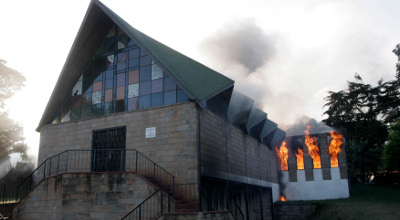Sudan Officials Threaten to Demolish Church Buildings
Local authorities have threatened to demolish three church buildings in Omdurman as part of a long-standing bid to rid Sudan of Christianity, Christian sources told Compass.
Officials from the Ministry of Physical Planning and Public Utilities-Khartoum State appeared at the three church sites in Omdurman, on the Nile River opposite Khartoum, the afternoon of Sept. 11, threatening to demolish the structures if the churches continued to conduct worship services, church leaders said.
Church leaders from the three churches in the Madinat al Fath area of Omdurman – the Sudanese Church of Christ, the Episcopal Church of Sudan and the Roman Catholic Church – said they were surprised to see government officials come to their church premises and accuse them of operating churches on government land without permission. The church leaders told Compass the buildings were not located on government land and required no permission.
They said that, starting at 2 p.m. the officials asked leaders of the Sudanese Church of Christ who had given them permission to build on government land, and then proceeded to the other two churches. The officials marked the three church buildings for demolition with red crosses, saying, “We are going to demolish these churches,” the church leaders said.
Jaafer al Sudani, manager of Church Affairs in the Ministry of Guidance and Religious Endowment, told Compass that officials there had no knowledge of church buildings to be demolished. The state planning officials insist that the churches are operating on government land.
Citing a growing tide of hostility toward Christians, members of the threatened churches said they were concerned about their future.
“These are clearly evil plans directed against churches and Christians in this country,” said Kornules Yousif, an area Christian leader.
“This is serious,” said another church member who asked to remain unnamed. “We do not want them to demolish our churches.”
Local Muslims complain of the Christian presence in the area, Yousif said.
“Muslims say churches are not supposed to be given permission to operate because the number of Muslims is greater than that of Christians,” he said.
Area Christians told Compass they take seriously such statements by Muslims as they reveal hostile motives by both the Islamic government and Muslim communities.
“These people can do everything possible to clear this country of Christianity,” said a member of one of the threatened churches.
At the same time, area Christians said they believe the government is quietly carrying out surveys on Christians and church programs as part of a broader effort to make Islam the official state religion; officials from the Ministry of Guidance and Religious Endowment have called church leaders, asking them to reveal information about their church members and activities of the Churches, they said.
“This is purely for intelligence purposes, so that they can put more restrictions on churches and Christians,” said the Rev. Yousif El-Denger Kodi, general secretary of the Sudanese Lutheran Church. “We as church leaders are aware of their plans, but we pray for God to rescue us from their evil plans.”
Islam is favored in law and policy in Sudan, according to the U.S. Department of State’s 2010 International Religious Freedom Report. While shariah (Islamic law) is only “a source of legislation” according to the Interim National Constitution, there is a movement afoot to make Islam the official state religion following the secession of largely non-Muslim southern Sudan on July 9.
“Muslims are not happy to see churches in their areas, because they believe in Islam and fear the influence of the church, and that is why they hate to see churches,” a church leader who requested anonymity told Compass.















































